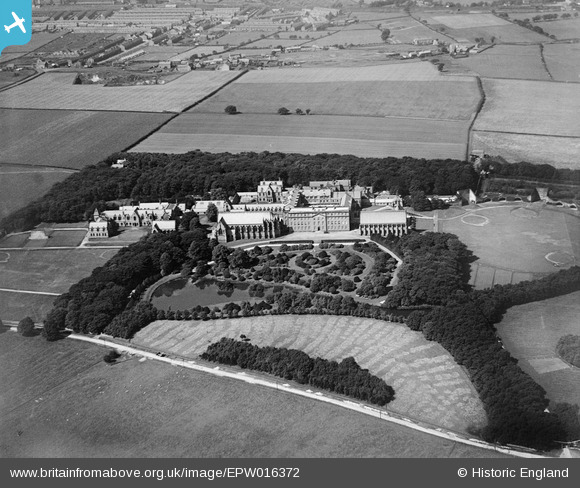EPW016372 ENGLAND (1926). Ushaw College, Langley Park, 1926
© Hawlfraint cyfranwyr OpenStreetMap a thrwyddedwyd gan yr OpenStreetMap Foundation. 2024. Trwyddedir y gartograffeg fel CC BY-SA.
Delweddau cyfagos (5)
Manylion
| Pennawd | [EPW016372] Ushaw College, Langley Park, 1926 |
| Cyfeirnod | EPW016372 |
| Dyddiad | 29-July-1926 |
| Dolen | |
| Enw lle | LANGLEY PARK |
| Plwyf | ESH |
| Ardal | |
| Gwlad | ENGLAND |
| Dwyreiniad / Gogleddiad | 421878, 543713 |
| Hydred / Lledred | -1.6597482080032, 54.787738932555 |
| Cyfeirnod Grid Cenedlaethol | NZ219437 |
Pinnau
Cyfraniadau Grŵp
 Cloughy |
Tuesday 29th of April 2014 09:00:46 AM | |
Ushaw College The aerial photograph we see of Ushaw College is deceiving because it does not give a true bearing on the position of Ushaw. It stands on a hill at least 50-100 metres above the Deerness Valley, Esh Winning the Browney Valley and Langely Park. Looking at the photograph you would certainly think it was a flat area. The college itself is situated about three miles from the magnificent Cathedral City of Durham on the roadway from Durham to Bearpark. The college was founded in 1808 and its main purpose was training of men and boys as priests in the Roman Catholic religion. At one time 400 students studied there, and there were thirty professors teaching them. Most of the students who studied at Ushaw entered at about 11 years of age and passed out as a priest at 26-27. The students spent a lot of free time walking around the valleys in groups to Esh Winning, Ushaw Moor and would visit the pubs and the cafés in the local villages. On leaving school at fourteen I got my first job, and that was working at Ushaw College as a pantry boy/junior butler. My main job was working in the parlour setting out tables for meals, serving food and clearing away all crockery and then washing it by hand, no dishwashers in those days, and the general work in the parlour. My reason for starting work at Ushaw College was, I did not want to work in the Coal mines as this was a dangerous and dirty job. It was the main industry that employed most men and boys in our area. There were ten different coal mines in a radius of five miles of my home, a street called Railway Terrace. This made it easy to get to work, most men walked to the place they were employed at or used a bicycle to get there. The journey would take no more than half an hour and a lot less to some of the surrounding pits. It was a lot safer travelling the roads in those early days as there was not the volume of traffic using them. Public transport was used more, there were more buses to be seen running than there is today. Buses were in great demand, people did not own as many private cars as we see on the roads today. I travelled to Ushaw College to work on my bicycle and this took about half an hour. We started work at 6-30am till 2-30pm, and 1pm till 8-30pm.The work we carried out did not change much, the same routine every day as many domestic staff did in those days. During the holidays or vacations as they were called in those days when the students were away from the college we had different jobs allocated to us. One of the jobs we performed was cleaning the silver. This was quite a task, as there were lots of altars and chapels displaying vast numbers of candles sticks, crosses, flower vases, which keep you going. We also cleaned the carpets in the many rooms on the different floors in the college - there were hundreds of these around the college.We carried them down the stairs and outside on to the grass and beat the dust out of them with a bamboo bat shaped like a tennis racquet. One job I recall to mind and smile to myself many times when I think about it was a task set for me in St Cuthbert’s Chapel. It was to clean the lectern known as the Ushaw Eagle. As you can see from the photograph of the lectern it is a beautiful work of art. Well out came my dusters and cleaning cloths and a tin of Brasso. This I opened and gave the lectern a liberal coat of Brasso. This in time dried in to the feathers and the rest of the Pugin designed artefact. Instead of looking like an eagle it was more like a white dove, Duggan’s design. It took two whole days to clean it up and bring it back to its original splendour with several pails of warm water and soap. Ushaw College is a magnificent place to visit. The staff and workmen working there covered most of the trades and skills and were nearly self sufficient. The domestic staff were comprised of chefs, cooks, kitchen staff, bakers, scullery maids and laundry personal. Seamstresses and many others were employed in the making of cottas and cassocks for priests and students, and in the early days men’s suites for most of the personnel. At that time there was a contingent of women and girls who had come over from Ireland to work at Ushaw College. They carried out the work of maids in the student dormitories. Most of the trades were covered- Painters, Bricklayers, Stone masons Electricians, Joiners, and even a chauffeur. Milk, meat, potatoes, and many other produce came from the college farm. There was also a large garden, an orchard, and several glass green houses, with several bee hives dotted around growing food served in the college. This was the way the college was run and the way of life for those students aiming to take up the priesthood. My time spent working at Ushaw College was not a long one, but I enjoyed my time in the surroundings and the work we did. It is a sad situation the Catholic Seminary at Ushaw College finds its self in today. After 202 years training priests it closed its doors in 2010. The remaining number of men, 22, have moved on to different locations hoping to fulfil their training as priest in the honour of God. Due to the endeavours of the trustees, and diocese of Hexham and Newcastle working with the University of Durham, Ushaw College is once again alive to the sound of student voices, of course the students and books are different, but it is the reawakening of history keeping education going in a different form but keeping a marvellous place for learning alive and fruitful. Syd |
 history group |
Tuesday 3rd of December 2013 02:38:34 PM |
TITLE ERROR - please note that Ushaw College had no connection with the University of Durham in 1926. This record is being amended... |
 Laura Maddison |
Monday 9th of July 2012 08:45:16 AM |
St Cuthbert's Roman Catholic Seminary. Opened 1808 to train priests primarily for the Northern Province. |
 anwyn |
Tuesday 26th of June 2012 07:46:20 PM |


![[EPW016372] Ushaw College, Langley Park, 1926](http://britainfromabove.org.uk/sites/all/libraries/aerofilms-images/public/100x100/EPW/016/EPW016372.jpg)
![[EPW016374] Ushaw College, Langley Park, 1926](http://britainfromabove.org.uk/sites/all/libraries/aerofilms-images/public/100x100/EPW/016/EPW016374.jpg)
![[EPW016373] Ushaw College, Langley Park, 1926](http://britainfromabove.org.uk/sites/all/libraries/aerofilms-images/public/100x100/EPW/016/EPW016373.jpg)
![[EPW016375] Ushaw College, Langley Park, 1926](http://britainfromabove.org.uk/sites/all/libraries/aerofilms-images/public/100x100/EPW/016/EPW016375.jpg)
![[EPW016371] Ushaw College, Langley Park, 1926](http://britainfromabove.org.uk/sites/all/libraries/aerofilms-images/public/100x100/EPW/016/EPW016371.jpg)





